Apocrypha: An Analysis of Halo Legends (with ZombiePie)
By gamer_152 0 Comments
Note: This article contains major spoilers for Halo Legends and Halo 3.
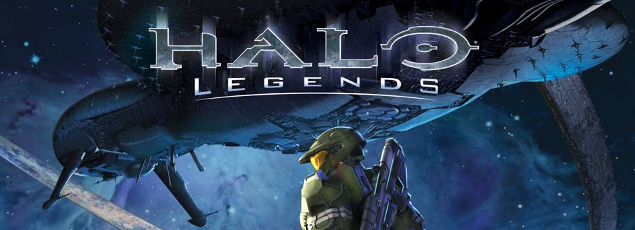
In the prehistoric era of early 2010, Bungie, the creator of one of the most influential shooters and sci-fi series to exist in games, were about to give one last hurrah to their absurdly popular property before jettisoning it for good. But 343 Industries, the inheritor of Halo, were just revving up. They were to be the Humanity to Bungie's Forerunner, and before they took on a new trilogy of Halo games, they cut their teeth on a Halo anime. Produced alongside six Japanese animation studios, Halo Legends is an anthology that aims to tell stories in this universe that couldn't be etched elsewhere, with a unique visual flair and foreign perspective. In this article, we (Gamer_152 and ZombiePie), two people who've frankly spend far too long thinking about Halo lore, will revisit the anime episode-by-episode to tell you where it fails to launch and where it lands among the stars.
Origins I & II
Synopsis: Told from the perspective of a mentally-deteriorating Cortana, these first two episodes are a condensed summary of the Halo canon from the Forerunner-Flood War up to Halo 3.
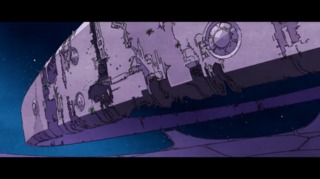
Verdict: When Halo Legends was originally broadcast, it was broadcast in an entirely different order. The episode listing was rearranged when the compilation was released on-disc, and that remixing has worked miracles. In the old sequence, Origins was the fourth entry. So you watched multiple episodes of the show before being given the contextualising background for it. Now, that backstory is the first thing you see when you hit "Play" which is how it should be.
Origins I and II were produced and directed by Studio 4°C, and if that name sounds familiar, it should. 4°C are respected stalwarts of adapting western media into the anime format with credits including the stunning Batman: Gotham Knight and the classic Animatrix. Origins' premise of prophetic narration detailing a sci-fi world's history is pulled right from 4°C's work on The Animatrix. For anyone looking to get up to speed with the Halo canon in a pinch, this is a neat primer. The episode also rises to the near-impossible task of providing a connecting theme for this anthology: It decides Halo is about humans trying to escape war and the tragedy of them falling back into this ancient pattern again and again. However, there is key information both missing and misrepresented in this record. Origins doesn't explain how the Human-Covenant War started, it's only a half-truth that the humans and Covenant made peace to fight the Flood, and Greg Bear's saga of novels has since retconned the version of Forerunner history presented here. Origins' commentary on Halo is also somewhat at odds with the values of the rest of the series.
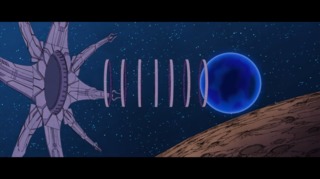
While Cortana's concept of war as a virulent disease is fascinating, the external Halo properties have far more respect for warfare, seeing it as our last line of defence against a universe that seeks to crush us between its palms. And if Cortana finds war that loathsome, why doesn't she or Halsey voice that disdain over the course of the games and novels? The episode is similarly confused about whether humanity's inquisitive nature is a positive trait. Cortana praises humans leaving Earth for the stars as an escape from the ruinous warfare that consumed them but uses their exploration of Halo as an example of how pursuing secrets breeds conflict. She simultaneously presents our curiosity as the cure to and cause of war. You'll also find that having her dictate the lore of universe to us is not nearly as captivating as slowly uncovering its mystery over the course of the games.
The Duel
Synopsis: In a comparatively primitive Elite society, an Arbiter named Fal offends the Covenant leadership with his disbelief in The Great Journey, their religion's path to the afterlife. A Prophet sends a warrior named Harka to slay Fal, and they both die in the resulting showdown.

Verdict: This episode was directed and produced by Production I.G. Anime fans can back us up when we say that I.G is the most inconsistent anime studio on the planet. There’s an exactly 50% chance that something they have had their hands on will turn out decent. In the case of The Duel, the odds weren't in our favour. Part of the draw of Legends is seeing how eastern artists might interpret this potently western property. Here, I.G. imagines early Elite society as nearly identical to feudal Japan, but that makes us feel like we're looking at part of human history when we should see somewhere literally alien. Usually, when western creators work on sci-fi narratives, there are little marks of our societies imprinted on their extraterrestrial civilisations that we fail to notice because they're so normalised to us. For this reason, we might have a stronger reaction to the cultural fingerprints Japanese artists leave on sci-fi than to those left on the artform by westerners, but the dissonance goes beyond simple culture clash. The western equivalent of this episode would have the Elites somehow living in a version of medieval Europe.
This Duel is also trapped behind a filter which makes it manifest as a kind of moving watercolour, but the watercolour style was developed for still images, and when this episode is in motion, you feel like you're watching its events through an unwashed drinking glass. It's a baffling direction decision considering this entry has three separate action scenes. These fight sequences are a nightmare to process because the colour saturation almost blends characters together. When we reach the final duel, you can barely tell who's who. Leaning so hard into the action also means there's little time to sit down and have characters tell us who they are, with the writers resorting to filling out the cast using worn-out anime tropes that feel flagrantly out-of-place in a Halo story. The giggling wife and corrupt master archetypes drove us nuts. The nicest thing we can say about this episode is that it does play smoothly off of Origins' idea that war is futile. Two men go to battle, and neither is the victor.
Homecoming
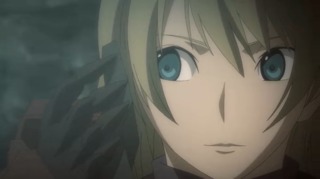
Synopsis: Homecoming jumps between Spartan Daisy-023's combat at the Battle of Harvest and her experiences upon being taken into the Spartan II supersoldier programme. Like all Spartan IIs, Daisy was kidnapped from her parents by the Earth government. She escapes the UNSC's clutches and returns home, only to find they've replaced her with a clone. She considers killing her double, but lacking the emotional callousness to go through with it, she leaves and returns to a life in the military. Her emotional defeat in her memory is soon matched by literal defeat on the frontlines.
Verdict: Homecoming was a joint venture between Production I.G. and Bee Train Production. Bee Train is best known for creating the .hack//Sign anime, and most recently, for their work in yuri romance. Given that background, it comes as no surprise that this episode has a female protagonist, but their handling of her is problematic, to put it mildly. While the Halo games have always been decidedly masculine, the early novels, at least, are refreshingly gender equal. The muscle mass, skill, and dedication of female Spartans are identical to that of their male counterparts. It's therefore disappointing to see that the woman Spartan in this episode has an effeminate profile, a flowery name, and a teddy bear hanging off of her armour. She is more driven by feeble-minded emotions than any other character in this series and escapes the military to run back to a literal rose garden. Even if the sexism wasn't enough to turn you off, the imagery is syrupy and cloying, and you can't get invested in the Fall of Harvest without some framing as to what it means for the world.
Odd One Out
Synopsis: In this comedy episode, a Spartan 1337 falls from a spaceship onto a planet inhabited by dinosaurs. A few young locals take interest in him, as do the Covenant who send a Brute named Pluton to stamp him out. As it transpires, the humans on the planet came from a crash-landed spacecraft piloted by an AI they call Mama. Mama uses her ship's weaponry to launch Pluton into orbit.
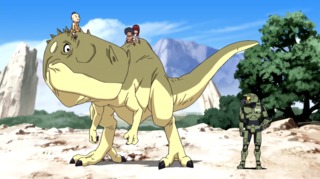
Verdict: In the episode listing of old, Odd One Out was the final instalment, and it was both far too weak and too off-tone to be the series encore. It's a net positive that 343 bumped it down in the order, but being honest, there's no appropriate place for a humorous interlude in a show about the hardships and sacrifice of war. We cut straight from a shot of a childhood toy on Daisy's corpse to a guy who's essentially Spartan Deadpool pratfalling through the atmosphere. Then, at the end of the ten minutes, we're yanked from 1337 being carried off by a pterodactyl to one marine dying in another's arms. Yet, pretend for a moment that those other episodes don't exist, and even on its lonesome, Odd One Out manages to be an embarrassingly unfunny piece of work.
This animation comes to us from Toei, the fine makers of Dragonball Z, and you see it in the artwork, but this script has nothing for those giddy at the indelible bravado of the Dragonball franchise. The episode is commonly described as a parody, but there's nothing about Halo it's riffing on; it's just a Z-list comedy that happens to have a Spartan in it. You could roast Master Chief's gravelly voice, contrivances like Delta Halo, or the humourless honour culture of the Elites, but every joke in Odd One Out basically revolves around a character running about with their arms flailing or making an exaggerated "Wha?" sound. This studio was doing "Leet" and "Shoop da Woop" memes in an anime from 2010. Meanwhile, the dinosaurs and caveman kids of this episode only serve to baffle the audience narratively, aesthetically, and thematically. This is, without a doubt, the worst item of Halo media to date, and Gamer would like to go on the record as saying this is one of the worst episodes of TV he has ever watched. Death is too good for the creators of Odd One Out.
Prototype
Synopsis: A marine nicknamed Ghost watches a fellow soldier die as she laments that he never showed enough humanity. A losing battle against the Covenant inspires him to steal an experimental mech and use it to mow down the enemy before he activates its self-destruct mechanism, killing himself in the blast.
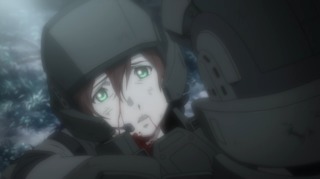
Verdict: This episode was produced and directed by the anime studio Bones. While the animation powerhouse is currently experiencing somewhat of a renaissance with the growing popularity of My Hero Academia, the late 2000s were a bit of a wasteland for them. The less said about Heroman and the second season of Darker than Black, the better, and Prototype is right down there with them in terms of quality. Its connection to the Halo series is tenuous at best; like many of the other episodes, it feels like a typical anime with some Halo trappings rather than a Halo story expressed as an anime. There's something patently wrong about the concept of Halo mecha, as these exosuits would seem to invalidate the MJOLNIR armour on which the series prides itself. If the UNSC can build a suit more robust and agile than MJOLNIR then why is MJOLNIR still in service?
Lore lawyering aside, the mech does allow for some of the slickest action in this series, but Prototype's dialogue is consistently atrocious. Here are some choice lines:
"I need you to be strong. Strong enough to do what you've never done in your life. Can you be strong enough to allow yourself to be— can you just be human?”
"If you could just allow yourself to feel something maybe you wouldn’t be a ghost any longer”.
"You're a soldier. A soldier with a promising future ahead of you. You're a soldier".
Do you want to know what the self-destruct mechanism consists of? It demands the user of the mech dictates the words "Be Human". In an unforgivably forced attempt at resolution, the writers literally put a screen in front of their protagonist with the words he needs to say to experience character growth on it. The password to a UNSC mech happening to refer to the particular inner conflict of a sole marine is beyond explanation. The implication that using the phrase "Be Human" or that simply blowing himself up makes Ghost human also displays an almost sociopathic lack of understanding about personhood.
The Babysitter
Synopsis: An insular squad of ODSTs are sent to kill a Prophet with the aid of Spartan Cal-141. Despite their annoyance at being accompanied by the Spartan, she repeatedly saves their lives, eventually sacrificing her's so that they might complete their mission. Too late, they come to value Cal's heroism.
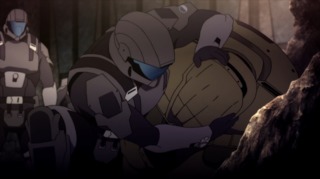
Verdict: It would be a stretch to call The Babysitter good television, but this might be the best episode of the bunch and that has a lot to do with how it successfully manages to plant an opinion in our head and then show us why we're wrong about it. At first blush, the ODSTs are aloof and mean-spirited, but by the end of the narrative, we come to understand that the exclusionary dynamic between their group and the rest of the troops is down to them being bound together by shared losses that the other soldiers haven't experienced. The episode works more because of what it doesn't do than what it does: It is free of the complication and cheap sentimental gambits which trip up other regions of this anthology. But its premise is wonky; the makeup of this team is all wrong for this essential a mission.
Elsewhere in the Halo fiction, Prophets are few in number and are the political load-bearers of the Covenant religion. They're wrapped in onion-like layers of defences, and even Master Chief has to move heaven and earth to fell one. So why are the UNSC sending their B-team and a single Spartan to kill one of the most powerful figures in the universe and why have we not heard about this assassination elsewhere? Surely it would send ripples out across the intergalactic discourse. There's also some ambiguity over whether the episode is trying to play Cal-141's gender as a twist; it would explain why we don't see her without her helmet until she dies and why she doesn't speak until the episode is virtually over (which is terrible for her characterisation, by the way). If we are intended to be mindblown that a woman might make a worthy soldier, that's not only insulting but makes no sense in the new episode order because we've already seen that there are female Spartans earlier in the series.
The Package
Synopsis: A vital UNSC asset has become trapped behind enemy lines; to win it back, they send Master Chief and the Spartan Blue Team after it. The squad shoot some guns, find out "the package" is actually Spartan creator Catherine Halsey, and complete their mission.
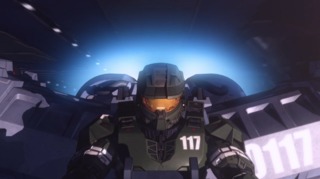
Verdict: The Package is where 343's all-star Rolodex of prestigious anime mastercrafters runs out, as this episode was put together by little-known production house Casio Entertainment. After some research, we're still unsure whether this is the same Casio that manufactured all those calculators, but we do know that they also provided contract work on Final Fantasy: Advent Children and that they up and vanished a few years back. You can easily believe The Package was put out by a studio versed in third-party support but not in developing shows from the pilot's seat. The animation here is swimmy and the dubbing conspicuous. The artists seem to be undecided whether they're going for a cartoonish or realistic style and human faces are a particular weakness of theirs. It's for the best that the Spartans keep their helmets on for most of the affair, and it's mind-boggling that this episode came out the same year as Halo Wars which had some of the most flooring CGI in any piece of Halo media.
It's also evident that this piece came from a studio of animators rather than writers. Half of The Package boils down to Master Chief and friends getting lost in the intestines of a Covenant ship, and the story is devoid of character development and meaningful revelations. Even in howlers like Odd One Out and Homecoming, we gained a new perspective on the characters and events by the end of the featurettes, but we don't learn anything new about these characters or their interplay here. The Package wants us to be shocked that the item that the Spartans are retrieving is Halsey and that the mother of the supersoldiers is in the crosshairs of the Covenant fleet. However, even at the time this episode was released, we knew that Halsey, Chief, and various other characters were alive at the conclusion of the trilogy and so they can't have died during this mission. Hence, there's no suspense. The details of the episode are unsound as the outline, with famous quotes from the games plucked from the context that made them coherent and clumsily crammed into The Package's military chatter. It's disorienting, inorganic, and along with the episode's showboating camera, makes the whole sequence feel like a lacklustre Saturday morning cartoon.
Conclusion
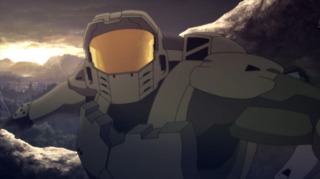
We cannot, in all good conscience, recommend Halo Legends. It's simply not clear who this series is for. Is it for newcomers who need the Halo backstory explained to them as it is in Origins I and II? Or is it for the hardcore fan who is the only person who's going to appreciate the lore minutiae of an episode like The Duel? Is it for audiences who want the dour drama of narratives like Homecoming's or Prototype's, or is the appeal meant to be action and levity as it is in episodes like Odd One Out or The Package? Add to this inconsistency fundamental misunderstandings of what kinds of stories complement the Halo universe and how humans relate to one another, and the anthology crumbles like chalk. The ambition of Halo Legends is a positive one; it's the hope of exploring how Halo's world might resonate with a whole other culture, but Legends is proof that such experiments sometimes produce media that cannot bridge that cultural gap and lose themselves in the divide. Thanks for reading.